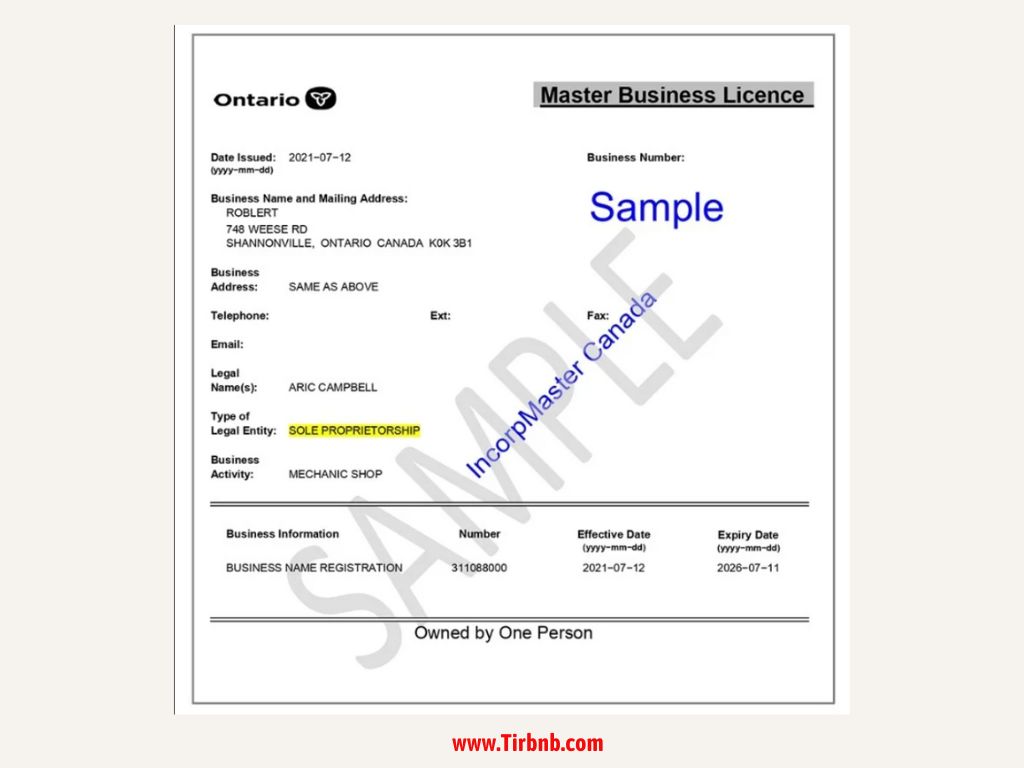How to Start a Business in Ontario: 12 Important Steps
Starting a business can be one of the most important decisions anyone can make in their entire life. It is a life-changing decision that can go either way. However, with the right amount of information and getting help from professionals, the answer to ‘How to start a business in Ontario’ will be much easier and achievable.
If you are moving to Toronto and starting a new and fresh business, we have gathered the most complete and thorough guide for starting a business in Ontario that will be with you along the way. So let’s begin this journey and hope for the best.
What Type of Businesses Have The Highest Chance of Success In Ontario?

First, let us discuss this important subject and why you should pay attention to it. While opening a business in Ontario, choosing your business type is the first and most important step. You can’t just jump into the sea and expect the best.
According to IBISWorld, here are some of the most profitable industries that have a high chance of success in Canada:
- Apartment Rental,
- Primary Care Doctors,
- Wireless Telecommunications Carriers,
- Beer, Wine & Liquor Stores,
- Management Consulting,
- Accounting Services,
- Heavy Engineering Construction.
Next time that you ask yourself how to find a job in Toronto, make sure to search for the highest market demands and be sure to find a position there.
Important Steps Of How to Start a Business In Ontario
Now that you know about some of the most profitable businesses in Ontario, it is time to answer the question of ‘How to open a business in Ontario’:
1. Identify Your Business Idea
The first and perhaps most exciting step in how to start a business in Ontario is identifying your business idea. This involves:
- Brainstorming Ideas: Start by thinking of business ideas that match your interests and skills. Consider what problems you can solve or needs you can meet in the market. Ask yourself what you’re passionate about and what abilities you can use.
- Market Gap Analysis: Look at existing businesses and find areas that are not being fully addressed. This could involve studying trends, checking customer feedback, and spotting opportunities for improvement or innovation.
- Skills and Resources Check: Take a look at your skills, available resources, and finances. Decide if you have what’s needed to make your idea work, or if you need to learn new skills or get extra funding.
Idea Validation: Once you have a business idea, check its potential by getting feedback from potential customers, experts, and mentors. Use surveys, interviews, and focus groups to see if there’s interest and find ways to improve your idea.
2. Market Research
Before starting a business, it’s important to research the market thoroughly. This means understanding demand, competition, your target audience, and the potential profitability of your idea. By learning about the market, you can make smarter decisions and improve your chances of success.

For example, employment agencies in Toronto offer different opportunities than those in other cities. Since each place has its own unique business environment, researching beforehand is key.
Once you have a great business idea, it’s important to research the market to see if it can succeed. Here’s a deeper look at how you can do it:
- Know Your Customers: Identify who your ideal customers are, where they live, and what they like. Understand their needs and buying habits.
- Study the Competition: Look at similar businesses, their strengths, weaknesses, and pricing. Find ways to stand out.
- Check Market Demand: See how many people want your product or service. Look at trends and seasonal changes to ensure long-term success.
- Stay Updated: Keep up with industry trends, rules, and new technology. Attend events, read industry news, and connect with experts.
- Use Research Tools: Gather data with surveys, polls, and online research tools to understand your market better.
3. Create a Detailed Business Plan
A solid business plan is essential for success. It acts as a roadmap for starting a business in Ontario, outlining your goals, strategies, and financial projections. Wondering how?
- Executive Summary: Give a brief overview of your business idea, target market, key advantages, and financial expectations.
- Company Description: Explain your business’s mission, vision, values, and legal structure.
- Market Analysis: Share your research on the market, including the target audience, competition, and demand.
- Products and Services: Describe your offerings, focusing on what makes them unique and their benefits.
- Marketing and Sales Strategy: Outline your approach to marketing, target customers, pricing, and sales goals.
- Management Team: Introduce your team and highlight their experience and skills.
- Financial Projections: Provide financial details such as startup costs, revenue estimates, and budgets.
- Funding Request: If seeking funding, specify the amount you need and how you will use it.
Appendix: Include relevant documents like research, permits, and legal agreements.
4. Choose a Name
The name you choose for your company can have a big impact on your success and help shape your brand identity.
In addition to wanting your name to be unique and make your company stand out in the competition, you should also want it to communicate to your target market what your company offers.
Generally speaking, your company name should have both a unique and expressive component. While the expressive aspect explains what services you provide to your customers, the distinguishing element is what makes your business name stand out.
5. Get Your Business Registered
Another important step in how to open a company in Ontario is being registered. Once the name of your company has been decided upon, it’s time to decide on the business structure and register the company. Regarding the kind of business you can register, you have two choices:
You can register your company as a
- corporation
- or a small business,
but before you make a choice, it’s important to know the distinctions between the two kinds of business structure arrangements.
Because a company is seen as an independent entity from its owners, its income tax is filed separately and the owners’ liability is restricted. However, people who register a small business must register another tax file for their business besides their personal one.
6. Create a Business Account
It’s possible that having business accounts apart from your personal ones will help your small business. This includes credit cards, business bank accounts, company loans, and credit lines that can help you better manage your spending and income.
- Research and Compare: Look into different business banking options, focusing on fees, interest rates, services, and online banking features.
- Documentation: Collect the necessary documents to open a business account, like your business registration, incorporation papers, and ID.
- Account Features: Pick a business account that offers services that suit your needs, like online banking, mobile access, and credit card processing.
- Financial Management: Use your business account to track income and expenses, keep your accounts updated, and monitor cash flow.
Before opening a business account for you, the bank will probably want to see a copy of your business registration, so make sure you have one.
7. Register Online
The next step of ‘How to Start a Business In Ontario’ is registering online. it is legally required for businesses to register. The Ontario Business Registry offers an online option for completing the process.
Details like your company name, address, and organizational structure must be provided. Enrolling your company ensures that it is recognized legally and contributes to brand protection.
8. Obtain Licenses and Permits
The next thing you’ll need to know is how to apply for an Ontario business license. To conduct business lawfully, you will require several licenses and permits, depending on the type of your industry and line of work.
To make sure you comply, we suggest you check the official website of the Ontario government since several licenses and permits may be needed.

9. Apply for a GST/HST number
The majority of firms in Ontario must register to obtain a GST/HST number, which entails opening an account with the federal government and collecting tax on all taxable sales.

- Registration Threshold: Determine if your business meets the GST/HST registration threshold, which is currently $30,000 in annual taxable sales (2025 update).
- GST/HST Collection: If you are registered for GST/HST, you must collect GST/HST on taxable sales and remit it to the CRA.
- Input Tax Credits: Claim input tax credits (ITCs) for GST/HST paid on eligible business expenses.
- Filing Deadlines: Comply with GST/HST filing deadlines to avoid penalties and interest charges.
- Resources: Consult the CRA website or a tax professional for guidance on GST/HST regulations and compliance requirements.
It may not be necessary for businesses with gross sales of less than $30,000 over four consecutive quarters to register for GST/HST, but it is still advisable to confirm your business status with a licensed tax accountant to make sure you stay out of trouble and keep making as much money as you can.
10. Establish a Strong Online Presence
The internet has made it possible for almost anyone to find whatever they’re looking for online. Even if you’re only operating a tiny local shop, failing to build your web presence might have a major negative effect on your company.
You want customers to easily find you and know that you can provide what they are looking for quickly and simply. How you want to start, grow, and manage your internet presence should all be part of your marketing strategy.
In this case, marketing agencies in Toronto might be helpful sources. Contact them and find the perfect agency to help you present your business to your potential customers.

11. Funding and Support
Starting a company in Ontario usually requires some investment. Getting enough funding and financial support is key to launching and growing your business.
Examine the venture capital, loans, and grants that the Ontario government offers to business owners. Financial loans can differ from each other based on the type of business you own. For instance, for small businesses you can get loans up to $100k, or for tech companies these numbers can go even higher.
For advice and resources, you should also think about getting in touch with nearby business development centers or small company support groups.
12. Consider Business Insurance
Lastly, on the list of things that must be done to get to the answer to ‘How to start a business in Ontario’ is insurance. It’s critical to safeguard your company from any threats and liabilities.
Getting business insurance coverage may be wise, depending on the type of your company. Speak with an insurance specialist to determine the best coverage options for your requirements.
Conclusion
Now if you are planning to start a business such as a cafe in Toronto or Ontario in general, you have a complete image of the way you have to start and make your cafe one of the best cafes to work in Toronto. We tried our best to provide a complete and thorough answer to ‘How to start a business in Ontario’ so you can have an easy and secure journey.
FAQs
If you still haven’t got the answer to ‘Hot to start a business in Ontario’ and have some questions in your mind, here are some of these questions that are popular and maybe not answered in the main text:
1. Can a Foreigner Start a Business in Ontario??
In Ontario, to register as some specific type of company such as an extra-provincial corporation, non-residents must hire an Agent for Service. A corporation with its registered office in the province, or any citizen or permanent resident of Canada who is at least eighteen years old, may qualify for this.
2. Is It Worth Starting a Business in Canada?
Canada offers countless advantages and limitless prospects for anyone searching for a location to establish a business. Initiating a company in Canada offers numerous benefits beyond its robust and steady economy and tax structure.


